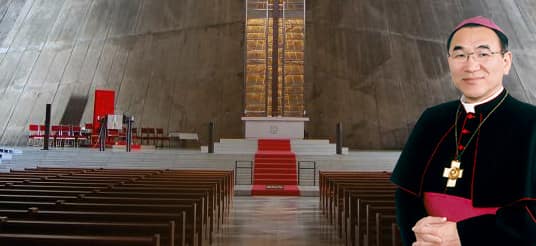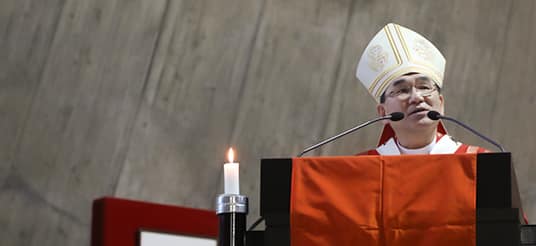Archdiocese of Tokyo

Guideline for the Catholic Mission Districts
Tokyo Archdiocese, February 24, 2003
Preface
After the 20th of April, the Easter of 2003, the Archdiocese of Tokyo will start the Catholic Mission Districts as the first step to the reorganization of parishes. The purpose of the Catholic Mission Districts is to encourage parish communities, or the former parishes, to work together in much deeper cooperation, and to prepare churches to live out their gospel mission more fruitfully. The task of the Catholic Mission Districts is to promote teamwork between priests themselves, and teamwork between priests, lay people and religious so that lay people can participate in the mission of church. We believe that as we try to change our churches into how they should be, this can also deal with the problem of a shortage of priests.
Participation of lay people in the mission of church is viewed from two different dimensions.
One is church activity; in many different ways, lay people can greatly participate in a large part of church activities. They can voluntarily hold bible reading and praying meeting or make volunteer groups. If necessary, they can officiate ceremonies and help Holy Communion service, and so on.
The other, decision making; in making decisions, lay people as well as priests play a very important role. When the discussion is held within church, it means that everyone in the church works together to reach a common understanding of the gospel. We have to discuss matters like, “what God hopes us to do for this area at this moment”, or “how churches animate the gospel evangelization activities” and for that “how the catholic facilities and finance situation should be”, and so on. Although it may be difficult to a lot of lay people, it is important that they participate in discussion of the Catholic Mission Districts and make decisions with their priests
Regarding church activities, they should be promoted by in each community. This guideline instead focuses on the latter dimension, how the decision should be made in Catholic Mission Districts. It also has set a basic line of how the Archdiocese of Tokyo function as a whole according in that respect. As related to this matter, ideas on Parish Community and the Pastoral Evangelization Advisory Committee will be announced later.
How the Catholic Mission Districts Should Operate
1. The basic line for the operation is that the Catholic Mission Districts should be flexible and phased. This doesn’t mean to unify the Diocese as one but it means to highly value the independence of each Catholic Mission District.
2. Coordinator Priests
Parish Communities that structure Catholic Mission Districts are on equal teams. In principle, a Parish Priest will be assigned to each parish community. A Parish Priest maintains the former authority and responsibility.
One Priest will be designated Coordinator. According to the recommendation by the Priest Team of Catholic Mission District, the Bishop will assign the coordinator. (Coordinator must be recommended by the end of May 2003)
A role that a Coordinator will be playing is as follows;
– Represent his Catholic Mission District
– Run the Pastoral Evangelization Advisory Committee (He can put work such as preparation, keeping contact and recording of the committee, into the other’s hands)
– Keep contact among priests and coordinate meetings. Run Priest meeting. Contact with the Bishop.
3. Priest Meeting
Priests Meeting should be held at least once a month with the District Priests. Information on the Gospel Evangelization Activities will be exchanged and cooperation among Priests will be notified and arranged.
4. Catholic Mission District Council
– Catholic Mission District must hold a council meeting at least once a month or every other month.
– Participations of Parish Priest from each Parish Community and representatives of lay people are mandatory. It is appropriate that Representatives of lay people are members of the Pastoral Advisory Committee. (To lighten the burden imposed on some particular lay people, a schedule should be carefully planed.) The number of the representatives can vary according to the conditions in each Catholic Mission District and Parish Community. Also if necessary, it should be considered that Assistant Priests, Associate Priests, Priests who take care of foreign pastoral in a wide area, and representatives of Religious Orders and Catholic facilities participate in the Catholic Mission District Council Meeting.
-The topics to be discussed at the council meeting are as below;
1, Respond to the need of the districts
2, How to convey information on the Gospel Mission and encourage interchanges among Parish Communities.
3, About joint liturgies, meetings, and events
4, Arrangement on expenses
5. Activity Report and Looking Back
Each Catholic Missions District will make its activity report to the Bishop once a year. What each Catholic Mission District has done will be looked back on and evaluated fairly by the whole Diocese after an interval of three years.
* Each Catholic Mission District must discuss the matters mentioned below and report the results to the Bishop by the end of July, 2003.
1, Names of your Catholic Mission District (Please think about name that shows your regional characteristics.)
2, Council members
3, Date and place
4, Operation
(Although the conditions of each region and independence of the Catholic Mission Districts are valued, if some overall arrangement is felt necessary when reports are submitted, another consideration will be given.)
* Next Step
1, By promoting phased-interchanges and corporation among Catholic Mission Districts, the next step will be that, in the future, what Catholic Mission Districts are now as a Council will transform to a “Community For the Gospel Mission”.
2, When a Catholic Mission District is arranged to be put in the hands of one Responsible Priest, this Catholic Mission District will function as what Canon Law refers to a “Parish”.
How the Parish Community Should Operate
How the Parish Communities Should Operate
The Catholic Mission District consists of several Parish Communities. In the near future, it will be necessary for the Diocese to standardize the rules of how the Parish Communities should operate. On the other hand, however, there is another way of looking at this. That is, what rules we need and standardize will be much clearer through experiences that Parish Communities in their own Catholic Mission District get to know each other, talk to each other and cooperate with each other. And so at this point of establishing Catholic Mission Districts, this guideline will state not the standardized rules but some respects that should be most carefully considered on how the Parish Community should operate.
It is an important task of the Archdiocese of Tokyo to establish better cooperation between Pastors and lay people within the Parish community and nurture a Catholic Mission District that lives out the Gospel Mission. For this we all must deeply take the following teachings to heart.
The teachings of No.37, “Lumen Gentium”, Second Vatican Council
“They should openly reveal to them their needs and desires with that freedom and confidence which is fitting for children of God and brothers in Christ. They are, by un of tho knowledge, competence or outstanding ability which they may enjoy, permitted and sometimes even obliged to express their opinion on those things which concern the good of the Church. When occasions arise, let this be done through the organs erected by the Church for this purpose. Let it always be done in truth, in courage and in prudence, with reverence and charity toward those who by reason of their sacred office represent the person of Christ.”
“Let the spiritual shepherds recognize and promote the dignity as well as the responsibility of the laity in the Church. Let them willingly employ their prudent advice. Let them confidently assign duties to them in the service of the Church, allowing them freedom and room for action. Further, let them encourage lay people so that they may undertake tasks on their own initiative. Attentively in Christ, let them consider with fatherly love the projects, suggestions and desires proposed by the laity.”
1. Name
After the 20th of April, the Easter of 2003, what Parishes and Sub-parishes now in Tokyo Diocese will be placed as “Parish Communities”. According to Canon Law terminology, each Parish Community can be also called “Parish” and ” Sub-Parish” as before. For the public, the name as used before will continue to be used.
2. Who Is Responsible
The responsible person of the Parish Community will be a Parish Priest as usual. A Parish Priest will take the final responsibilities of the pastoral Evangelization, maintenance of the buildings and administration in each Parish Community. He does not take all the responsibilities to himself. It is rather more important for the Parish Priests to fulfill the obligation through communication and cooperation with the other priests, religious and especially many lay people.
3. Advisory Committee Where Lay People Participate
Most Parishes have organizations called “Church Council”, ” Parish Council”, “Finance Council” and so on. In such organizations, lay people play their roles to operate churches. As these names are not standardized in Tokyo Diocese, it is more appropriate to use Canon Law terms, “Pastoral Evangelization Advisory Committee” and ” Economical Advisory Committee”. (According to Canon Law terminology, when important issues are discussed, they are viewed from two different dimensions; one is economic, the other pastoral. The term here ” Pastoral” refers to the whole church activities that are to evangelize and help people. In Japanese, however, the meaning of this term is too narrow to reflect the activities. It is easier to think this as “Pastoral Evangelization”.
4. Pastoral Evangelization Advisory Committee (cf. 536. New Canon Law)
This committee does not only control the advantages and disadvantages for the parish; rather its aim is to discuss the whole church activities and to lead the decision to the pastoral line. Important decision-making requires priests and lay people.
5. Nomination of the members of Pastoral Evangelization Advisory Committee
Nomination of the members for Pastoral Evangelization Advisory Committee will be considered so as that the opinions of the community members will be clearly aired. Parish Priest must pay attention to the fair nomination of the members.
6. Economic Advisory Committee
Canon Law requires that an Economic Advisory Committee be operative in each parish for property management and administration. (cf.537. New Canon Law) This committee is to help priests with the administration. It encourages lay people to use their technical knowledge and reflect their opinions on matters. When difficulty occurs for several reasons, an Economic Advisory Committee can get Pastoral Evangelization Advisory Committee to hold its post concurrently.
7. Laity Assembly
Many churches hold a Laity Assembly for lay people to freely participate in and discuss. This type of assembly is the right and proper forum for lay people to discuss important issues of parish community and to confirm a community consensus.
8. For Fair Nomination; what pastors should pay attention to
Pastors should try to lighten the burden imposed on a specific group of lay people. Also they should see to it that the same person does not continue the same position for a long time. For Women and the youth to participate in the administration of the church more easily and delightfully, pastors should take some steps about fair nomination.
Pastoral Evangelization Advisory Committee For the Diocese
Pastoral Evangelization Advisory Committee that is held in the Diocese inquires Diocesan Pastoral Evangelization activities. This Committee replies to the inquiries of the Archbishop, or give proposals to the Archbishop. In some occasions, it implements commissions that the Archbishop gives the committee.
The members of the Pastoral Evangelization Advisory committee consist of mainly lay people as well as priests and a few Religious. The first committee is scheduled in fall of 2003. Further details will be announced when preparation is set.
We will rearrange the Meeting of Church Council, which is held twice a year, and establish another meeting for the representatives from all the Catholic Mission Districts and Parish Communities.
The guideline is settled and announced as above.





